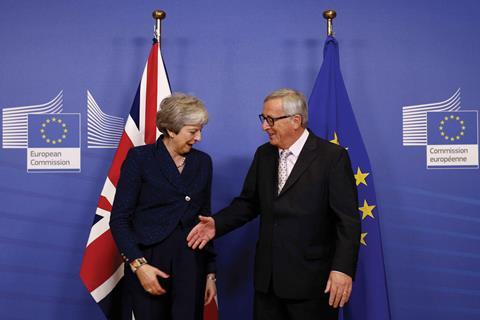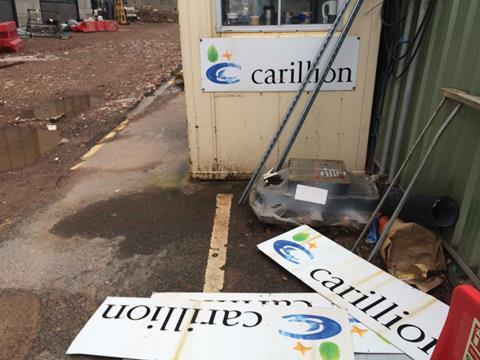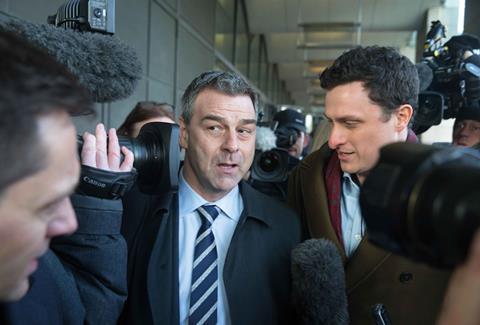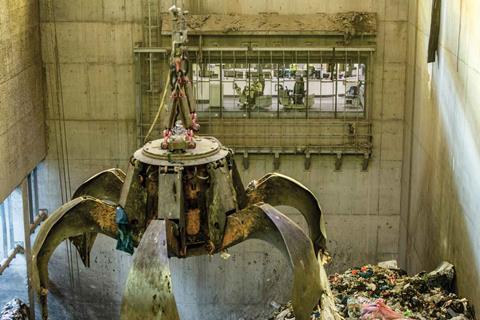So, what did SantaŌĆÖs last round of offerings bring the industry? ItŌĆÖs not been a stocking full of pleasant surprises. True, the weather did finally cheer up round about April and we got given a half-decent sector deal, but judging by the ongoing lack of certainty on Brexit or a rapid regulatory response to Grenfell, Santa didnŌĆÖt even read our list. Joey Gardiner and the ║┌Č┤╔ńŪ° news desk ungratefully weigh up the gifts that stopped giving in 2018

ItŌĆÖs that time of year again. Putting up the Christmas tree. Sending out cards. Decking the halls with boughs of holly, or, more likely, cheap tinsel from Lidl ŌĆō whatever works. But while some traditions can be tailored to fit, every child knows the most important ritual is the carrot, mince pie and brandy for Santa and his reindeer on Christmas Eve. How else can you expect to get a domestic skip full of exciting presents the following morning?
Unfortunately, on the evidence of the past year, the construction industry looks to have been guilty of putting out insufficient morsels to tempt Father Christmas and his helpers in 2017. Because many of the gifts forthcoming in 2018 were ŌĆō letŌĆÖs be honest ŌĆō underwhelming.
The Christmas list, posted to Lapland in good time, had been pretty clear: construction wanted certainty on Brexit, a stable economy, quick resolution on necessary post-Grenfell regulatory changes, and no nasty surprises. What it got was the collapse of Carillion, a seemingly eternal winter, little Grenfell resolution and unending, agonising, uncertainty on Brexit.
The collapse of Carillion ŌĆō pretty much the first present to be unwrapped ŌĆō was undoubtedly the biggest but by no means the only unwelcome gift. Others included further company failures, the very public delays to the construction of Tottenham HotspurŌĆÖs new ground, and the cancellation of CrossrailŌĆÖs expected 2018 opening.
Meanwhile the shock waves from Carillion continued to reverberate through the industry on projects such as the Aberdeen Western Peripheral Route bypass and the Royal Liverpool and Midland Met hospitals, as well contributing to the ongoing pain at contractor Interserve, which throughout struggled to withstand the impact on its finances of its own contract difficulties.
Read more: Carillion collapse
Read more: Tottenham stadium
The bad weather at the start of the year may not have been a great surprise, but the continuation of sub-zero temperatures in many places until the end of March was the gift equivalent of toiletries from the 99p bargain bucket at Wilko. Snow and ice hit the industryŌĆÖs output in the first quarter, right at the moment many clients paused to digest the implications of Carillion.
Of course, no one wants to be ungrateful. And the stocking ŌĆō if not bulging ŌĆō did contain some useful, albeit uninspiringly practical gifts. After the first three months, things ŌĆō along with the weather ŌĆō improved. Output picked up and sunshine brought some optimism as Help to Buy-supported home buyers flocked to sites. The government published a sector deal that contained spending commitments and, most importantly, sent a message that the government values and wants to help the industry.
But overall 2018ŌĆÖs gifts were the metaphorical cheap novelty sock: unlooked-for but wholly unsurprising. Dame Judith HackittŌĆÖs review of fire safety regulations, for example, followed the thrust of her interim report from December 2017, recommending welcome process changes but making clear reform would be hard graft over several years. Brexit negotiations ebbed and flowed as cabinet ministers came and went, seemingly according to the political calculation of those involved rather than any sense of national interest. The whole spectacle conspired to be at once desperately farcical and matchlessly tedious.
As 2018 trundled to a close, negative sentiments again predominated. The bombshell of Crossrail ŌĆō first delayed until late next year and this week put back until who knows when ŌĆō was detonated, while political leadership teetered on the abyss, bringing the prospect of either a Corbyn-led government or a damaging no-deal Brexit ŌĆō or even both ŌĆō into view as distinct realities for 2019.
This year, letŌĆÖs make sure the brandy is first-class, the carrots are fresh and the mince pies are from Waitrose. And maybe our stockings will bulge with goodies for 2019. Or heaven knows what awaits ŌĆ”

Brexit
The construction industry barely had time to reach for its Alka-Seltzer on New YearŌĆÖs Day before Brexit was making sector headlines, with Labour peer Andrew Adonis quitting his post chairing the National Infrastructure Commission over the handling of Brexit by the government on 1 January.
Two other early stories set the predominantly negative tone for the year on the issue. First, London mayor Sadiq Khan issued a report predicting that a no-deal Brexit could cost 43,000 construction jobs in the UK. Then in February contractor Bouygues kicked off a corporate trend by saying Brexit was already hurting its results. Over the year, the likes of Crest Nicholson, Kingspan, Eric Parry Architects, WYG, Osborne and HOK all issued various flavours of Brexit warning.
Catch up on the latest Brexit construction news

While Theresa MayŌĆÖs provisional divorce deal at the end of 2017 had provided some optimism early in 2018 that progress could be made, the negativity deepened as time dragged on without the government forming any agreed position on the way forward. By the time MayŌĆÖs uncomfortable Chequers arm-twisting forced some temporary unanimity in July, many in the industry were starting to calculate the implications of leaving without a deal at all. Aecom, Arup, the RIBA and JLL were among 42 organisations to write to the prime minister that month desperately urging clarity, while T&T warned of a ŌĆ£BrexodusŌĆØ of construction talent.
In September the government admitted that UK construction products would not be able to be sold on the continent in the event of a no-deal Brexit. Then in October came confirmation of the sectorŌĆÖs worst fears: a speech by May stating the UKŌĆÖs future migration strategy would not allow in unskilled workers from the EU.
The draft withdrawal agreement finalised by May last month was given a mixed reception by the industry ŌĆō with some worried about foreign labour, and some considering that any deal securing market access was better than no deal at all.
But so bad was the draft deal, uniting Remainers and Leavers, that May postponed the vote until at least 21 January. And the agony goes on.

Carillion
The collapse of ┬Ż5bn-turnover Carillion was the mouldy satsuma in our stocking ŌĆō not just the biggest construction story of the year, it was the biggest of the decade. The debt-laden contractor and support services firm ŌĆō the second-largest in the industry ŌĆō went into compulsory liquidation on 15 January after the government turned down its pleas for a ┬Ż160m bail-out.
One of the governmentŌĆÖs biggest suppliers, engaged on numerous high-profile jobs, the fallout of its collapse was enormous and immediate, with 30,000 suppliers left out of pocket to the tune of ┬Ż1.2bn. Nearly 3,000 employees lost their jobs, including hundreds of apprentices, albeit customers and rivals stepped in to save more than 10,000 other roles.


The collapse came after the business failed to recover from a shocking ┬Ż845m profit warning that had been made the previous July, exacerbated by an alleged ┬Ż250m unpaid debt for work undertaken in Qatar. The circumstances around this profit warning, and whether it was credibly the first moment that Carillion executives knew something was wrong, was thrown under intense scrutiny, with several separate inquiries launched into what went wrong. MPs on a joint parliamentary committee slammed CarillionŌĆÖs directors for ŌĆ£recklessness, hubris and greedŌĆØ following weeks spent grilling former Carillion executives, advisers and accountants in evidence sessions that resembled nothing so much as a public stocks.
As the politics rumbled on, clients and suppliers continued to deal with the real-world effects. The government was forced to bail out the two giant unfinished hospital PFI projects it was engaged on, the Royal Liverpool and the Midland Metropolitan in Birmingham. CarillionŌĆÖs collapse was cited as a contributory cause in a number of company administrations, including Sammon Group and Aspin.
While CarillionŌĆÖs directors endured public humiliation, and former finance directors Richard Adam and Zafar Khan remain under investigation by the Financial Reporting Council, the chief executive at the time of the collapse, Keith Cochrane, has already bagged a new role ŌĆō non-exec chair of Scottish engineer Score Group.

2018ŌĆÖs big losers
Even discounting Carillion and Tottenham HotspurŌĆÖs new stadium, there were a worryingly large number of construction losers in 2018. Struggling construction firm Interserve, whose share price nosedived nearly 90% over the year amid the continuing fallout from botched energy-from-waste contracts, was probably the most conspicuous. Investors saw a construction firm big on support services and Middle East contracts suffering from PFI-related pain, and it didnŌĆÖt take them long to twig where theyŌĆÖd seen that combination before. Even a bank refinancing in April failed to stem the pain for long, and Interserve has ended the year telling shareholders their stakes are pretty much worthless as it calls in the banks for another rescue.
While football club SpursŌĆÖ project problems have been more dramatic, Crossrail was the highest-profile scheme to suffer, with its bosses admitting delays and cost rises after years of assurances it was on time and budget. This week the bill for the railway went up another ┬Ż2bn, with new chief executive Mark Wild admitting ŌĆ£there is still a huge amount to doŌĆØ. To cap it all, he canŌĆÖt say when it will open, either.
Catch up: Crossrail delays
Catch up: Interserve
The furore claimed the scalp of the man chairing both that project and HS2, Sir Terry Morgan ŌĆō who resigned in December on the assumption he would otherwise be sacked. On Crossrail he was replaced by Tony Meggs, while HS2 is now headed up by former Atkins chair Allan Cook. While fingers were pointed primarily at CrossrailŌĆÖs vastly complex signalling systems, earlier construction delays contributed to the programme squeeze. The project is now under investigation by the National Audit Office.
Aussie contractor and developer Lendlease suffered probably the most painful project reversal of the year, with its ┬Ż2bn appointment to build 6,000 homes for Haringey council cancelled amid a local row over the regeneration plans. The firm launched legal action against its former customer for costs, though later settled.


While much of the economy remained stalwart in the face of political uncertainty, pain in the retail sector deepened considerably, mostly as a result of the move from physical to online selling. With retailers such as Toys R Us, Maplin and House of Fraser dropping like flies, retail landlords paused to survey the damage. The most obvious symptom was Hammerson delaying its planned ┬Ż1.4bn extension to the Brent Cross shopping centre set to be built by Laing OŌĆÖRourke.
The biggest losers of all were those construction businesses that didnŌĆÖt make it through the year. The number of collapses soared 20% in the wake of CarillionŌĆÖs fall, with 780 building firms going bust in a three-month period. Four businesses owned by Lagan Construction Group, and employing 200 people, were among the more high-profile to go under, while employment on the Hinkley Point project couldnŌĆÖt save ┬Ż15m-turnover Bristol-based subcontractor Dancourt.
Read: Dancourt - The story of one firm brought down by poor cash flow
Others to fail included Manchester subbie GPL, 150-year-old Yorkshire fitout firm H Waterhouse & Sons, Scottish housebuilder Deveron Homes and M&E specialist Vaughan Engineering, which said Carillion was in part responsible for its failure.

2018 winners
While the big stories of this year may all have come with a certain amount of negativity, there was also some good news to hit the construction sector during 2018. Stick with us.

A standout on the project front was the Fosters-designed Bloomberg building, which hauled in the accolades. The Sir Robert McAlpine-built project in the City of London earned Sir Norman Foster his third Stirling prize, scored the top gong at the British Council for Offices Awards and won ║┌Č┤╔ńŪ°ŌĆÖs own Project of the Year.
In contrast to its peers, Balfour Beatty repaid almost ┬Ż253m of debt with cash that was available within the group. This means the contractor has paid down 45% of its gross debt in the last 12 months. And not a refinancing in sight.
Finally, the well-regarded Ian Lawson, the man who left the top job at Severfield due to poor health in January, re-emerged, taking up the position of chair at another steel specialist, Billington, in September.
Read: The Bloomberg ║┌Č┤╔ńŪ°, London

Contractors under pressure
Interserve, hobbled by its disastrous foray into the energy-from-waste market, undertook one refinancing and this week said it would give details of another early next year. In essence, this involves its lenders turning their debt into equity, with the banks set to have a much greater say-so on what happens at the business ŌĆō which has racked up a ┬Ż650m net debt pile. The firmŌĆÖs share price sank ŌĆō again ŌĆō to the point that one analyst, CenkosŌĆÖ Kevin Cammack, has not even given it a rating ŌĆō buy, sell or hold. In a lament on the firm, he added: ŌĆ£A series of events not just EfW has conspired to all but put paid to this former near ┬Ż1bn business.ŌĆØ
Last month, Kier bit the bullet, in CammackŌĆÖs words. The UKŌĆÖs second-biggest contractor closed out 2018 in somewhat spectacular fashion, announcing a ┬Ż264m rights issue that the firmŌĆÖs chief executive, Haydn Mursell, said would remove at a stroke the debt cloud that had hung over the business all year. The groupŌĆÖs share price plummeted as the market digested the news.
Read: KierŌĆÖs shares plummet
Another firm forced into a rights issue was Galliford Try, which in April raised more than ┬Ż140m to cover its losses on a scheme to build a bypass around Aberdeen.
And the countryŌĆÖs biggest private contractor, Laing OŌĆÖRourke, made the rare move of effectively issuing a trading update at the end of October, saying it wouldnŌĆÖt file its overdue 2018 accounts until Christmas at the earliest, blaming ŌĆ£historic turbulence in the construction sectorŌĆØ for the delay. This is the second year in a row itŌĆÖs missed the deadline, having filed its 2017 accounts five months late.



























No comments yet